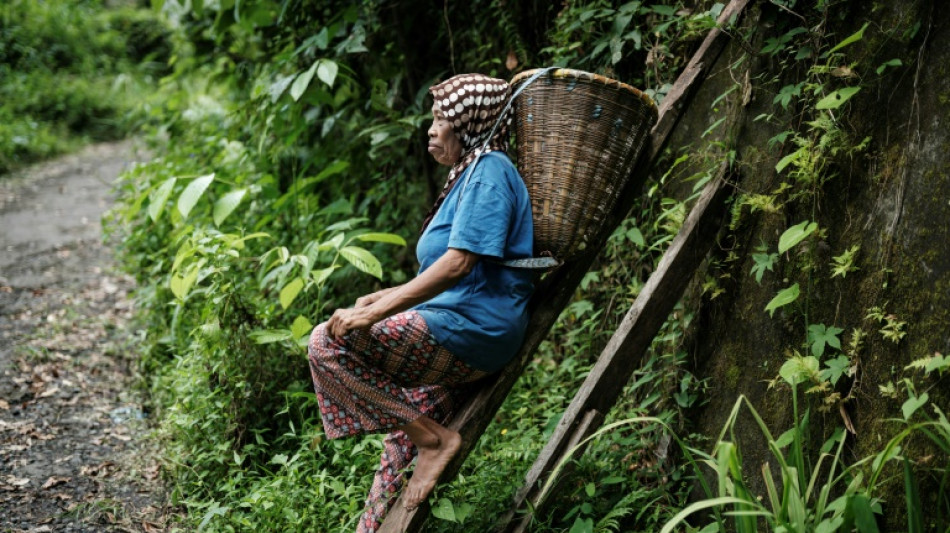
-
 Myanmar pro-military party claims Suu Kyi's seat in junta-run poll
Myanmar pro-military party claims Suu Kyi's seat in junta-run poll
-
Fed chair Powell says targeted by federal probe

-
 Trailblazing Milos Raonic retires from tennis
Trailblazing Milos Raonic retires from tennis
-
Australia recalls parliament early to pass hate speech, gun laws

-
 'One Battle After Another,' 'Hamnet' triumph at Golden Globes
'One Battle After Another,' 'Hamnet' triumph at Golden Globes
-
Japan aims to dig deep-sea rare earths to reduce China dependence

-
 Top UN court to hear Rohingya genocide case against Myanmar
Top UN court to hear Rohingya genocide case against Myanmar
-
US sends more agents to Minneapolis despite furor over woman's killing

-
 Trump says Iran 'want to negotiate' after reports of hundreds killed in protests
Trump says Iran 'want to negotiate' after reports of hundreds killed in protests
-
Bangladesh's powerful Islamists prepare for elections

-
 NBA-best Thunder beat the Heat as T-Wolves edge Spurs
NBA-best Thunder beat the Heat as T-Wolves edge Spurs
-
Ukraine's Kostyuk defends 'conscious choice' to speak out about war

-
 Trump says working well with Venezuela's new leaders, open to meeting
Trump says working well with Venezuela's new leaders, open to meeting
-
Asian equities edge up, dollar slides as US Fed Reserve subpoenaed

-
 Hong Kong court hears sentencing arguments for Jimmy Lai
Hong Kong court hears sentencing arguments for Jimmy Lai
-
Powell says Federal Reserve subpoenaed by US Justice Department

-
 Chalamet, 'One Battle' among winners at Golden Globes
Chalamet, 'One Battle' among winners at Golden Globes
-
Turning point? Canada's tumultuous relationship with China

-
 Eagles stunned by depleted 49ers, Allen leads Bills fightback
Eagles stunned by depleted 49ers, Allen leads Bills fightback
-
Globes red carpet: chic black, naked dresses and a bit of politics

-
 Maduro's fall raises Venezuelans' hopes for economic bounty
Maduro's fall raises Venezuelans' hopes for economic bounty
-
Golden Globes kick off with 'One Battle' among favorites

-
 Australian Open 'underdog' Medvedev says he will be hard to beat
Australian Open 'underdog' Medvedev says he will be hard to beat
-
In-form Bencic back in top 10 for first time since having baby

-
 Swiatek insists 'everything is fine' after back-to-back defeats
Swiatek insists 'everything is fine' after back-to-back defeats
-
Wildfires spread to 15,000 hectares in Argentine Patagonia

-
 Napoli stay in touch with leaders Inter thanks to talisman McTominay
Napoli stay in touch with leaders Inter thanks to talisman McTominay
-
Meta urges Australia to change teen social media ban

-
 Venezuelans await political prisoners' release after government vow
Venezuelans await political prisoners' release after government vow
-
Lens continue winning streak, Endrick opens Lyon account in French Cup

-
 McTominay double gives Napoli precious point at Serie A leaders Inter
McTominay double gives Napoli precious point at Serie A leaders Inter
-
Trump admin sends more agents to Minneapolis despite furor over woman's killing

-
 Allen magic leads Bills past Jaguars in playoff thriller
Allen magic leads Bills past Jaguars in playoff thriller
-
Barca edge Real Madrid in thrilling Spanish Super Cup final

-
 Malinin spearheads US Olympic figure skating challenge
Malinin spearheads US Olympic figure skating challenge
-
Malinin spearheads US figure Olympic figure skating challenge

-
 Iran rights group warns of 'mass killing', govt calls counter-protests
Iran rights group warns of 'mass killing', govt calls counter-protests
-
'Fragile' Man Utd hit new low with FA Cup exit

-
 Iran rights group warns of 'mass killing' of protesters
Iran rights group warns of 'mass killing' of protesters
-
Demonstrators in London, Paris, Istanbul back Iran protests

-
 Olise sparkles as Bayern fire eight past Wolfsburg
Olise sparkles as Bayern fire eight past Wolfsburg
-
Man Utd knocked out of FA Cup by Brighton, Martinelli hits hat-trick for Arsenal

-
 Troubled Man Utd crash out of FA Cup against Brighton
Troubled Man Utd crash out of FA Cup against Brighton
-
Danish PM says Greenland showdown at 'decisive moment' after new Trump threats

-
 AC Milan snatch late draw at Fiorentina as title rivals Inter face Napoli
AC Milan snatch late draw at Fiorentina as title rivals Inter face Napoli
-
Venezuelans demand political prisoners' release, Maduro 'doing well'

-
 'Avatar: Fire and Ashe' leads in N.America for fourth week
'Avatar: Fire and Ashe' leads in N.America for fourth week
-
Bordeaux-Begles rout Northampton in Champions Cup final rematch

-
 NHL players will compete at Olympics, says international ice hockey chief
NHL players will compete at Olympics, says international ice hockey chief
-
Kohli surpasses Sangakkara as second-highest scorer in international cricket


Climate change takes spice from Indonesia clove farms
Colonial powers once sought to wipe out cloves grown by locals on the eastern Indonesian island of Ternate to safeguard their monopoly over the prized crop. Today farmers say the gravest threat to their plants is climate change.
"Today... rainfall is high. It's okay for planting, but it's uncertain for harvesting. It's often unpredictable," farmer Jauhar Mahmud, 61, told AFP.
Nestled on the fertile foothills of Indonesia's Mount Gamalama volcano, Jauhar proudly shows off his favourite clove tree, which once reliably delivered profitable produce.
The fragrant flower buds that form the spice can only deliver their prized smell and taste in specific temperature and humidity ranges.
In a good season, the best of Jauhar's 150 towering trunks can spurt 30 kilogrammes of the aromatic spice used for medicine, perfumes, cigarettes and food flavourings.
But bad weather is becoming more frequent, causing uncertainty that makes prices fluctuate from $5.30 to $7.40 per kilogramme and life increasingly tough for farmers.
Food and Agriculture Organisation data from the past two decades shows Indonesia's clove yields vary significantly, more than rival producers. The yield in 2023, the last year data is available, was almost a quarter lower than a 2010 peak.
"We're actually losing money. Cloves do not bear fruit every year. They depend on the season," said Jauhar, who represents 36 clove farmers on the island.
Many are taking on other jobs as yields that typically arrive in August and September dwindle.
Jauhar sells spice-infused drinks and bamboo on the side to make ends meet, and some are considering abandoning the crop altogether.
"Farmers are now reluctant to harvest because of the high cost and minimal return," he said.
Indonesia accounts for more than two-thirds of global clove production, according to the FAO, though the majority is consumed domestically.
Since 2020, it has fallen behind Madagascar as the world's top exporter of the spice, World Bank trade data shows.
- Rainfall rise -
Centuries ago, Ternate's farmers defied colonial orders to eradicate their clove production by planting out of sight of the Dutch.
The island's then-favourable climate kept the crop alive.
Clove trees can take more than a decade to mature, and flowers can only be harvested in a small window that depends heavily on weather conditions.
But climate change caused mainly by burning fossil fuels like coal has changed global weather patterns.
Ternate is drier overall, but when rain does come, it is often in intense, damaging bursts.
That is consistent with broader trends linked to climate change. A warmer atmosphere holds more moisture, and rain can fall erratically and in large amounts when it comes.
Farmers like Lakina, who owns 10 clove trees, say the crop no longer offers the same returns.
"In the past, I could get five to six sacks in one harvest," said the 52-year-old. Now she fills two to three sacks, she said.
The changing weather affects other aspects of the trade.
Imba, a 62-year-old clove farmer with 70 trees, says it used to take three-and-a-half days to dry the cloves, but "because of the rain" it now takes at least five days.
Scientific research bears out the farmers' observations.
In 2023, researchers at Indonesia's University of Pattimura found clove yields were falling on Haruku island south of Ternate.
They said rainfall increased 15 percent in recent decades, along with extreme weather events that harm crops.
It has left clove farmers struggling.
"Communities living in coastal areas and small islands are especially vulnerable," said Arie Rompas, Greenpeace's forest campaign team leader.
"The productivity of their precious clove and nutmeg trees is dropping, and they are facing post-harvest problems with increased heat and humidity."
- 'Pride to future generations' -
At a spice sorting shop, the pungent warm smell of clove fills the air as workers scoop a pile into bags for weighing.
The men send them off to a warehouse where a mechanical sorting tray shakes the cloves, removing dirt and unwanted foliage before export to China.
For these clove sellers, climate change means lower quality and falling prices.
"If it's too hot, the crop is no good. Too much rain, no crop. This year there was too much rain," said supplier Rumen The.
He says prices almost halved from the start of last year from 150,000 rupiah per kilogramme to 80,000 in the harvest season, but were back up to 115,000 today as supply dwindled.
Production "is probably 30 to 40 percent" down on recent years, he added.
Jauhur urges rich spice-importing countries "to think about global climate issues" that threaten its future.
Despite the challenges, he says there are powerful "historical and emotional reasons" to continue farming.
"Our parents maintained cloves in clove's oldest region in the world," he said.
"They planted... to bring pride to future generations."
R.Shaban--SF-PST



